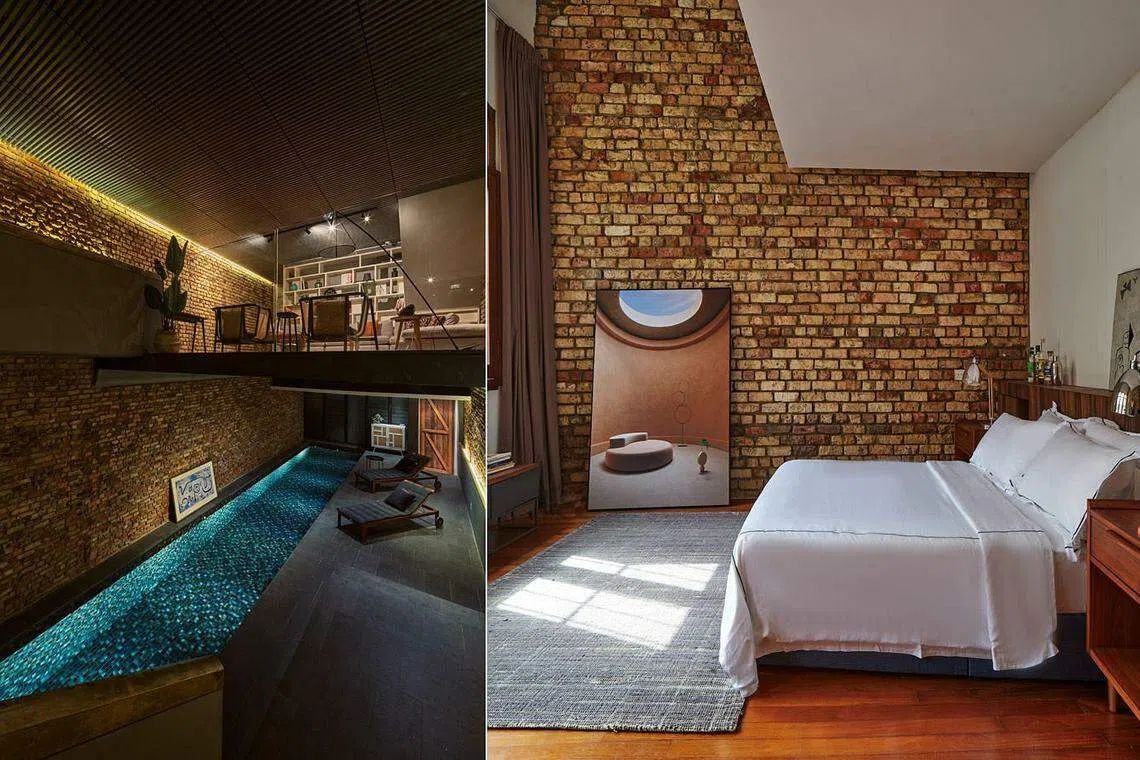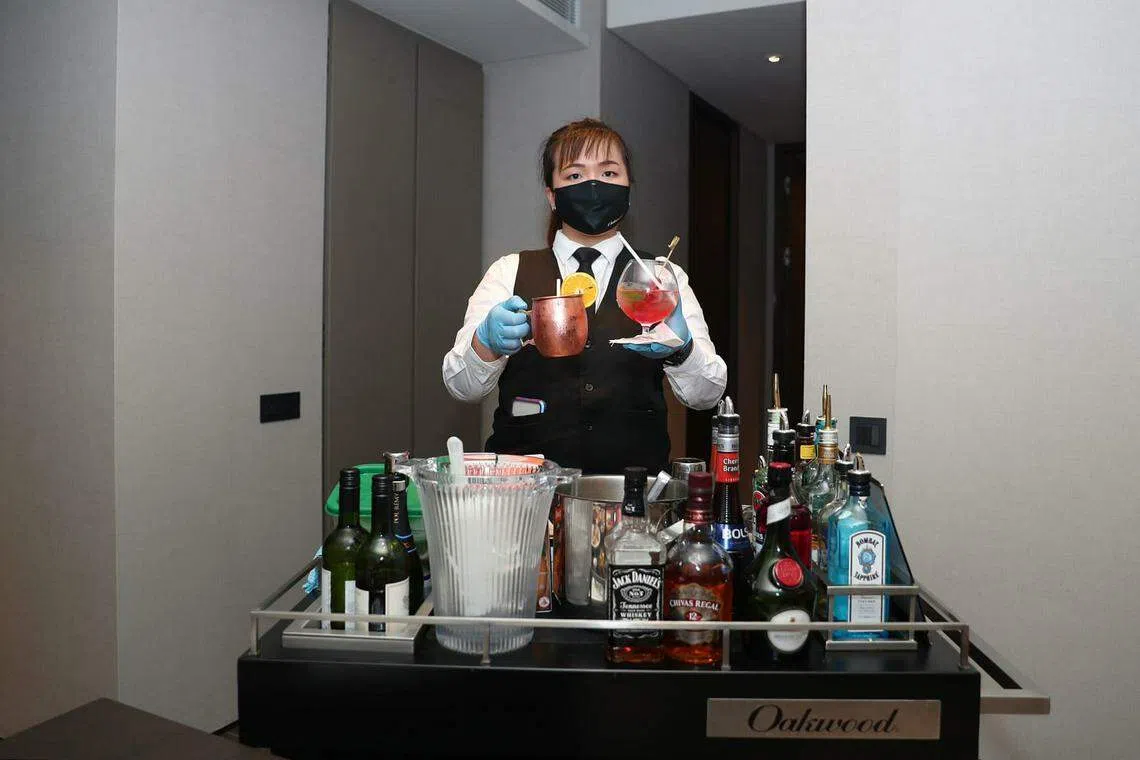More millennials want to work outside their home, here's why
The new WFH normal is seeing more Singaporeans moving out of family homes into formerly expat-dominated co-living properties and serviced residences.

WHEN the government announced at last April's Circuit Breaker that working from home would be the default arrangement for companies, legal counsel Shawn Loh began searching for a home away from home.
From April to July 2020, he stayed in a one bedroom suite at Lanson Place Winsland, a serviced residence along Orchard Road. He then moved into another one bedroom apartment at Fraser Residence Orchard and stayed for another six weeks.
Since last September, he has been renting a one-bedroom apartment in East Coast. He has no plans to return to his family home yet, unless the work from home practice officially ends. His company has given up its office lease and all staff are working from home.
Jowyn Goh, who is about to start a new job as a regional commercial leader with an American healthcare MNC, has been renting a studio in a shophouse in Geylang, owned by co-living operator Figment. Ms Goh has been living there since February and will be staying on till the end of the year.
Mr Loh and Ms Goh are among the increasing number of Singaporeans who, because of the coronavirus pandemic, have been moving out of their family homes and into rental properties. But rather than pick the conventional rental home, they have zoomed in on co-living properties and serviced residences.
"The Circuit Breaker was announced and implemented within a short time, so serviced residences were the most practical and feasible choice because of how rapidly I could move in," says Mr Loh who also writes about his experiences on his Secret Life of Fatbacks website. "The suites came with all the essential amenities, so it was plug-and-play for my short-term stay."
Navigate Asia in
a new global order
Get the insights delivered to your inbox.
Ms Goh used to share an apartment when she was living overseas. Calling herself an "introverted extrovert", she loves having her private space but at the same time having others around the house to interact with, hence the idea of co-living appealed to her. In addition, Figment's short lease and hassle-free moving in process also appeal to her.
In demand for alternative rentals
Like hotels, co-living and serviced residence operators also suffered a drop in occupancy rates when the Covid-19 pandemic hit Singapore. But occupancy rates are now back on the rise.
Fang Low, founder of Figment, says at the end of last year's Circuit Breaker, occupancy rates dropped to 60 per cent. "Thankfully, occupancy rates have picked up and we are now operating at above 90 per cent," he says.
Sophie Jokelson, chief marketing officer and co-founder of Cove, a co-living operator, noted that occupancy rates dropped during the circuit breaker period, but have since returned to about 90 per cent.
Serviced residence provider Oakwood's average occupancy rate has been "consistently healthy at 60 per cent across our properties in Singapore", says its CEO, Dean Schreiber.
More Singaporeans signing leases
Previously more popular with the expat crowd before the Covid-19 pandemic, co-living properties and serviced residences are seeing more Singaporean tenants sign up with them.
Pre-pandemic, only 10 per cent of Figment's tenants were Singaporeans, but now it has grown to 30 per cent.

Ms Jokelson says that the growth of interest from locals for Cove's properties was "very fast". About 35 per cent of its tenants are Singaporeans, up from a small 5 per cent before the pandemic.
Kelvin Lim, executive chairman and group managing director of LHN Group, which operates Coliwoo, a collection of co-living properties, says that about a third of their tenants are Singaporeans.
There are several reasons for this increase, including homes not always suited for work from home purposes.
Mr Loh moved out of his family home, because his bedroom wasn't soundproof and lacked sufficient space for a work station. In addition, he was also worried about bringing home any possible infection.
Ms Goh chose to move out to get the private space she needed and also not to let the nature of her work, which sometimes involved taking multiple calls, even at meal times affect her parents' lifestyle.
Figment's Mr Low also noticed that some of his tenants are Singaporeans returning from overseas who, rather than move back into the family home, prefer to maintain their independence by choosing to co-live.
Another reason that has seen more Singaporeans move into serviced residences and co-living properties is the delay in their home renovations.
Mr Schreiber says "the challenges in the construction and home improvement industries locally have similarly created a need for serviced apartments due to extended transition period during home renovations and relocation".
Wong Kar Ling, The Ascott Limited's managing director for Southeast Asia and head of strategy and global operations, says that while it has a strong base of long-stay guests comprising expats and corporate guests, the firm has also seen some locals on extended stay of over 30 nights.
These guests include homeowners seeking temporary housing solutions during home renovations due to construction delays, she says.
Sashi Rajan, senior vice president, advisory and asset management for JLL Hotels & Hospitality, Asia Pacific, is not surprised at how well such operators are doing.
"Serviced apartments have emerged as the most resilient space in the Covid-19 world within the broader global hospitality industry," he says. Part of the reason for the resiliency of serviced apartments is attributed to the long contracts of one or two years, with some signed before the pandemic, which applies to corporate expat clients. And some expats may also opt for serviced residences while in a transition period.
"Similarly with local Singaporeans, who may have planned a temporary extended stay whilst renovating their main residence, now have to stretch this out further accounting for delays due to the labour shortage and disruptions to material supply chains," says Mr Rajan.
He adds that co-living is popular because it promotes an element of community and socialising. And there is also the shorter lease that appeals to Singaporeans. "Co-living operators are tapping in mid-term lease space, of three to 12 months - a length of stay that does not fall into any traditional sectors, targeting the younger demographic through attractive rates," he says.
More importantly, Mr Rajan says that, "co-living and service apartment operators are adapting their offerings to align with any opportunity that presents itself".
Upgrading features for the new market
Indeed, such operators have been upgrading their hardware and offerings to meet the changing needs of its tenants.
For example, all studios in Figment homes now have proper desks to meet work from home demands, and the firm has also upgraded the wifi system in its 22 shophouses.
Over at Cove, the firm recently launched its Cove Luxe apartments, which come with luxury furnishing. It has two other offerings, Cove Classics and Cove Basics, which are priced lower but with simpler furnishing.
With their tenants staying in more often than before, Cove has also put in bigger fridges in some of its apartments, improved its wifi system and also added in desks.
It also offers tenants a rental service, for items such as an extra small fridge, coffee machine, exercise equipment and even artworks. "Renters are an overlooked and underserved segment of the market, and we want to be able to meet their needs," says Ms Jokelson.
At Coliwoo's newest location at Keppel Road, all its 47 units come with a work area, an ensuite bathroom, kitchenette and a washer cum dryer. This is unlike other co-living spaces, where there is more sharing of amenities. "We believe that self-sustaining units would be the preferred way of living, especially with the pandemic ongoing," says Mr Lim. Its tenants can, however, still socialise at a private backyard and lounge.
While Oakwood's serviced apartments are already designed for long-term living with their bigger living spaces, well-equipped kitchens and amenities, the firm has found ways to make stays there even more comfortable.
For example, its Oakwood Premier AMTD Singapore property has a Premier Mobile Bar which it launched in 2019, so that guests can make their own cocktails in the privacy of their apartments.

"When Covid-19 hit, this concept became even more relevant, catering to guests who preferred to enjoy their club lounge experience in the safety of their apartments," says Mr Schreiber.

The Garcha Group which owns boutique hotels Duxton Reserve, Maxwell Reserve, The Vagabond Club and the soon to open Serangoon House recently launched MYPOSHPAD, said to be Singapore's first all-inclusive luxury co-living boutique hotel experience.
The Garcha Group spokesman says, "since the pandemic, we have seen an increase in market demand for staycations and business travel, MYPOSHPAD was launched to adapt to the new demands of our guests as we offer competitive rates for long-term stays. The decrease in international tourists has also opened up occupancy that we'd like to fill with our MYPOSHPAD members."
Since its launch in April, the take-up rate has been positive with most members being international business travellers. "However, we have also seen an increase in enquiries from Singaporeans - they include local business professionals who are looking to live in the heart of the city and also young couples looking to cohabitate," says the spokesman.
In for the long haul
Operators are certain that even when international travel resumes, their properties will still be popular with Singaporeans.
Oakwood's Mr Schreiber says that over the period of the pandemic, serviced apartments have seen great interest from guests, locals included, and have, in fact, grown from an alternative form of accommodation to a preferred way of living.
"In particular with the rise of flexible working arrangements, we have seen a growing group of local guests who have opted to explore alternative work and stay arrangements outside of their homes," he adds.
With remote work becoming the new normal, Figment's Mr Low says that co-living companies would do well to include services that cater to work requirements as well.
"We might see remote work hubs sprouting up in local neighbourhoods outside of the CBD for increased productivity and convenience, something which we are currently experimenting with in Kongsi House in Jalan Besar, where we have combined co-living upstairs with co-working on the ground floor for a vibrant mixed use experience."
Ms Jokelson says that Cove's business strategy was never focused only on expats, even when they were the firm's early adopters.
"Our long-term plan has always been to build an expat and local community," she says. "We want to provide young Singaporeans with alternative accommodation." She is confident that with prices starting from S$700 a month for a Cove Basics room, having properties in the CBD and heartland locations such as Toa Payoh and Clementi and with multiple apartment types to choose from, more Singaporeans will want to rent with Cove.
LHN Group is expanding the Coliwoo brand with two more co-living locations, at Balestier and Beach Road.
Mr Lim says the co-living apartments at Balestier Road will be designed more as a home/office hybrid to meet the demands for remote work. The units will come with more space dedicated for work, more storage areas, a space for printers, and even for exercise.
He believes that the percentage of Singaporean tenants will also grow. "We see more millennials who value their privacy and independence and would want to move out of the family home," he says. With the short lease from just six nights, although the average length of stay is seven months, and with affordable prices, "these factors will also appeal to young Singaporeans", he says.
Decoding Asia newsletter: your guide to navigating Asia in a new global order. Sign up here to get Decoding Asia newsletter. Delivered to your inbox. Free.
Copyright SPH Media. All rights reserved.
